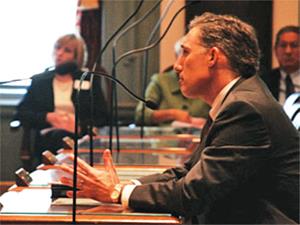|
Delaware appraisal and
judicial activism
by
David Marcus
| Published
August 4, 2015 at 1:22 PM
"Judicial activism" is the most charged phrase in
American legal theory. Arthur Schlesinger Jr. injected it into popular
discourse in a 1947 Fortune magazine article on the U.S. Supreme
Court, and liberals and conservatives seized on it as a term of
opprobrium for jurisprudence they did not like, usually in a highly
political area and usually from the nation's high court.
But the extremes of judicial activism, such as Roe v.
Wade for those on the right and Citizens United v. Federal Election
Commission for liberals, obscure a serious question that the phrase
assumes away. Judges have broad leeway to shape the law, and their
decisions about the limits to impose upon themselves are dictated at
least as much by personality and temperament as by ideology.
The difficulty of those choices is clear in a recent
Delaware decision on appraisal, a subject of growing concern within
Delaware corporate law.
On July 13, Vice Chancellor J. Travis Laster (pictured)
issued a ruling in which he held that institutional investors may not
seek appraisal of their shares of Dell Inc., which was sold last year
to an investor group led by company founder and CEO Michael Dell.
The Dell decision involves the definition of
"shareholder of record" under Delaware law, a surprisingly convoluted
point because of changes in the 1970s in how shares are held. The
current interpretation of the law governing the definition bars
several of Dell's institutional shareholders from seeking appraisal,
Laster wrote. But he encouraged the state's Supreme Court to revisit
an issue on which it ruled five years ago. In that case, Crown Emak
Partners LLC v. Kurz, the high court specifically declined to take up
concerns surrounding the definition, saying it was one for the
legislature.
Laster wrote the lower court opinion in Crown Emak and
reiterated the argument he made there for the Supreme Court to tweak
the definition of "holder of record" to account for the creation of
securities depositories Cede & Co. and the Depository Trust Co.
"The Delaware courts play a particularly significant
role in the corporate arena," Laster wrote in his Dell decision.
"Historically, the judiciary, rather than the General Assembly, has
taken the lead when addressing corporate law issues. Two leading
commentators have noted that the Delaware Supreme Court has not
traditionally deferred to the prospect of legislative action."
Instead, the pair - Edward Rock of the University of Pennsylvania Law
School and Marcel Kahan of New York University Law School - wrote,
"The Delaware Supreme Court has shown a certain degree of discomfort
with, perhaps even hostility to, legislative intrusions into its
domain."
That assessment has at least some validity, which shows
that what constitutes judicial activism varies depending on context.
But even individual judges may have different views on how far their
ambit extends. It may be that Leo E. Strine Jr., the current chief
justice of the Delaware Supreme Court, is more aggressive than his
predecessor Myron T. Steele.
As Laster noted at the end of the Dell opinion, the
corporate bar's focus on appraisal has increased along with the
incidence of appraisal arbitrage, a controversial practice in which
opportunistic shareholders file for appraisal to extract a quick
settlement. The effect of the rise of appraisal arbitrage on the
position the Supreme Court takes on the issue is ambivalent. On the
one hand, the benefit of a realistic definition of "holder of record"
would arguably be greater than it was five years ago; on the other,
the Delaware Supreme Court now would be more closely scrutinized for
wading into the area. It's easier to be activist when no one is
looking.
Judicial activism refers to a court's willingness to
overturn laws or venture into areas of social policy, and it's most
relevant to appeals courts that focus on questions of law rather than
fact. The Court of Chancery's focus on corporate law allows it to
address questions like the one Laster faced in Dell, but it is also a
trial court. As such, its judges must decide how aggressively to
manage the cases before them. That question permeates the treatment of
the fiduciary duty cases that accompany virtually every acquisition of
a publicly traded Delaware corporation.
Led by Laster, the judges on the Court of Chancery have
become increasingly aggressive in rejecting settlements of those duty
cases in which target company shareholders receive only additional
disclosures. (Because the cases are styled as class actions, judges
must approve proposed settlements.) On July 8, Laster refused to
approve a proposed settlement of litigation brought by shareholders of
Aeroflex Holding Corp. who challenged the company's sale to Cobham
plc. He was particularly concerned by the release from future
litigation against Aeroflex that the settlement included.
On the same day, Vice Chancellor John Noble pondered
the issue of global releases in deferring a decision about whether to
approve a proposed settlement in shareholder litigation arising from
the $8.3 billion sale of Intermune Inc. to Roche Holding AG. The
coincidence of the Aeroflex and Intermune hearings led some observers
to wonder if the Court of Chancery was setting out a major change in
policy on global releases.
The judges may be further emboldened by an objection
that Fordham Law School professor Sean Griffith filed to the proposed
settlement of shareholder litigation arising from the $3.6 billion
sale of Riverbed Technology Inc. to Thoma Bravo LLC and Teachers'
Private Capital. Along with Penn's Jill Fisch and Steven Davidoff
Solomon of the University of California School of Law, Griffith
earlier this year published "Confronting the Peppercorn Settlement in
Merger Litigation: An Empirical Analysis and a Proposal for Reform,"
in which the authors argue that disclosure-only settlements provide no
value to shareholders and that judges should reject them as a basis
for fee awards.
Griffith bought a few shares in Riverbed and other
target companies in order to challenge disclosure-only settlements.
But it's unclear why the courts should treat him with any more
deference than they generally give shareholder plaintiffs who buy a
few shares of stock in order to bring a fiduciary duty case (or, more
accurately, have a plaintiff's lawyer bring it for them).
Institutional shareholders and public pension funds are fully capable
of challenging disclosure-only settlement but virtually never do so,
either because they like a system that continually forces companies to
disclose more information and gives judges some oversight over the
sales processes in even non-conflicted deals or because the economic
impact of the settlements and the payment plaintiffs' lawyers' fees is
immaterial to them.
Most class-action litigation involves a dispersed group
of individuals who generally lack the means and sophistication to
engage in complex litigation. That isn't the situation in Delaware
fiduciary duty litigation. Institutions such as Fidelity Management
and Research and the California Public Employees' Retirement System
don't need Sean Griffith to speak for them, and Delaware should be
wary of allowing him to do so.
| ©Copyright 2015, The
Deal. |
|


